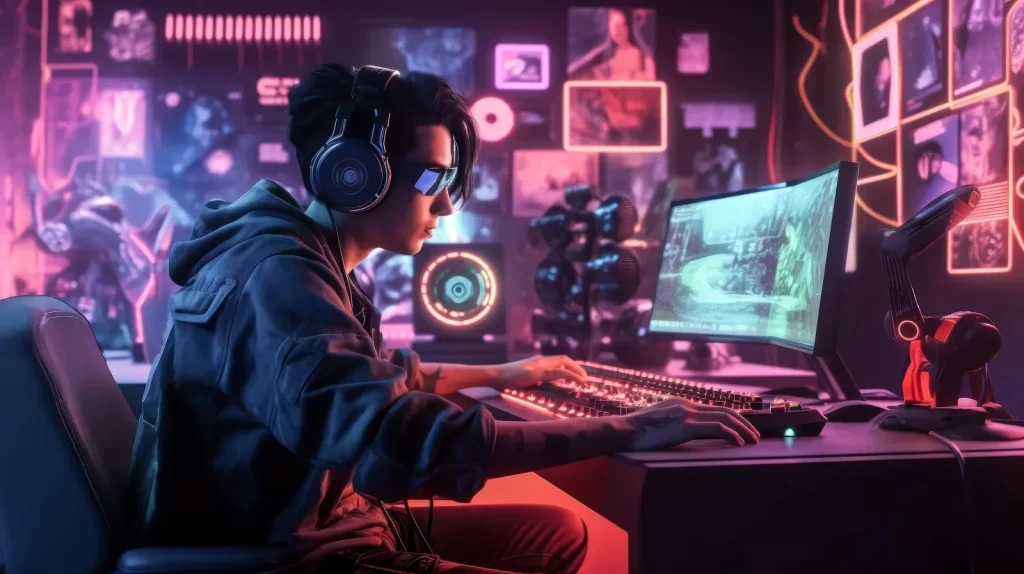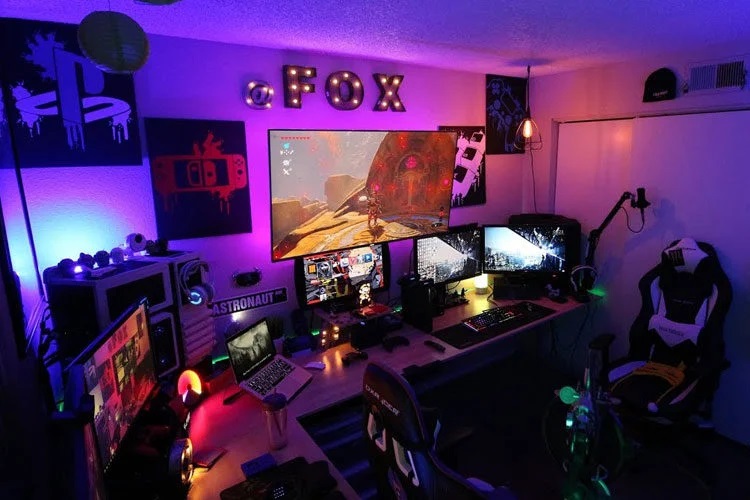Artificial Intelligence (AI) is playing a pivotal role in shaping the future of the gaming industry, transforming everything from gameplay mechanics to the way games are developed, distributed, and played. Here’s a detailed look at the various ways AI is impacting the gaming world:
1. Enhancing Gameplay and AI-Driven Characters
AI has revolutionized non-player characters (NPCs) by giving them behaviors that feel more human-like. In the past, NPCs followed simple scripted actions, but modern AI can make them adapt to the player’s actions in real-time, creating a more dynamic and challenging gaming experience. Games like The Last of Us Part II and Red Dead Redemption 2 employ complex AI-driven NPCs that react to player decisions, enhancing the overall narrative depth.
Additionally, AI is used for procedural generation of game environments, ensuring endless variety. Games like No Man’s Sky and Minecraft use AI to create vast, procedurally generated worlds, allowing players to explore unique environments every time they play.
2. Personalized Gaming Experiences
AI is also enhancing personalization in games. By tracking player behavior, AI can dynamically adjust difficulty levels and gameplay elements to match the player’s skill level. This ensures that players are consistently challenged without feeling frustrated. This system is seen in games like Left 4 Dead and Resident Evil 4, where the AI adapts to how the player is performing.
Moreover, AI-powered recommendation systems now help gamers discover new titles based on their past gaming behavior, similar to how streaming platforms recommend movies or music.
3. Game Testing and Development
AI is speeding up game development by automating many of the repetitive tasks involved in game testing. AI algorithms can simulate player behavior, identify bugs, and ensure smoother gameplay experiences. For instance, AI-powered tools like Unity’s ML-Agents have been developed to help game creators train their games’ AI, ensuring more natural player interactions and game responses.
Additionally, AI tools are used to generate content, reducing the time spent by developers on designing assets like textures, levels, and character models. This allows developers to focus on the creative aspects of their games.
4. AI in Graphics and Animation
AI has significantly contributed to graphics enhancement in gaming. Through techniques like Deep Learning Super Sampling (DLSS), AI helps upscale lower-resolution images in real-time, improving frame rates without compromising visual fidelity. This technology is already being used in Cyberpunk 2077 and Control, allowing for smooth gameplay without the need for expensive hardware upgrades.
AI is also being used in animation, enabling more realistic movements and facial expressions. For example, the facial animation in games like Detroit: Become Human is powered by AI that generates more lifelike and responsive animations based on player choices.
5. AI and Game Audio
AI is also shaping the auditory experience in gaming. Dynamic soundscapes that change in response to in-game events are powered by AI, creating a better environment. Games like Red Dead Redemption 2 use AI-driven audio systems that react to the player’s actions, from changing the soundtrack during intense moments to modifying environmental sounds depending on the location.
6. AI-Powered Game Streaming and Cloud Gaming
AI is also being leveraged in the growing field of cloud gaming. Services like Google Stadia, NVIDIA GeForce Now, and Xbox Cloud Gaming use AI to optimize gaming performance by reducing latency and ensuring smooth gameplay. AI-powered prediction systems are used to minimize lag, enabling players to have a better gaming experience even when they do not own high-end hardware.
Additionally, AI tools are being integrated into streaming platforms to enhance viewers’ experiences by automatically tracking gameplay, providing data analytics, and even generating highlights of key moments.
7. The Future of AI in Gaming
As AI continues to evolve, it is expected to bring even more significant advancements to the gaming industry. One emerging trend is the use of AI in narrative design, where AI could help create unique storylines based on player choices, pushing the boundaries of interactive storytelling. The use of AI in virtual reality (VR) will also enable better and personalized experiences, where the environment and characters respond intuitively to a player’s actions.
Conclusion
The impact of AI on the gaming industry is indulging, from the development of smarter NPCs to enhancing game environments and personalizing player experiences. As AI technology continues to advance, we can expect to see even more creative applications that push the boundaries of game design and offer players an even more engaging, dynamic, and personalized experience.


